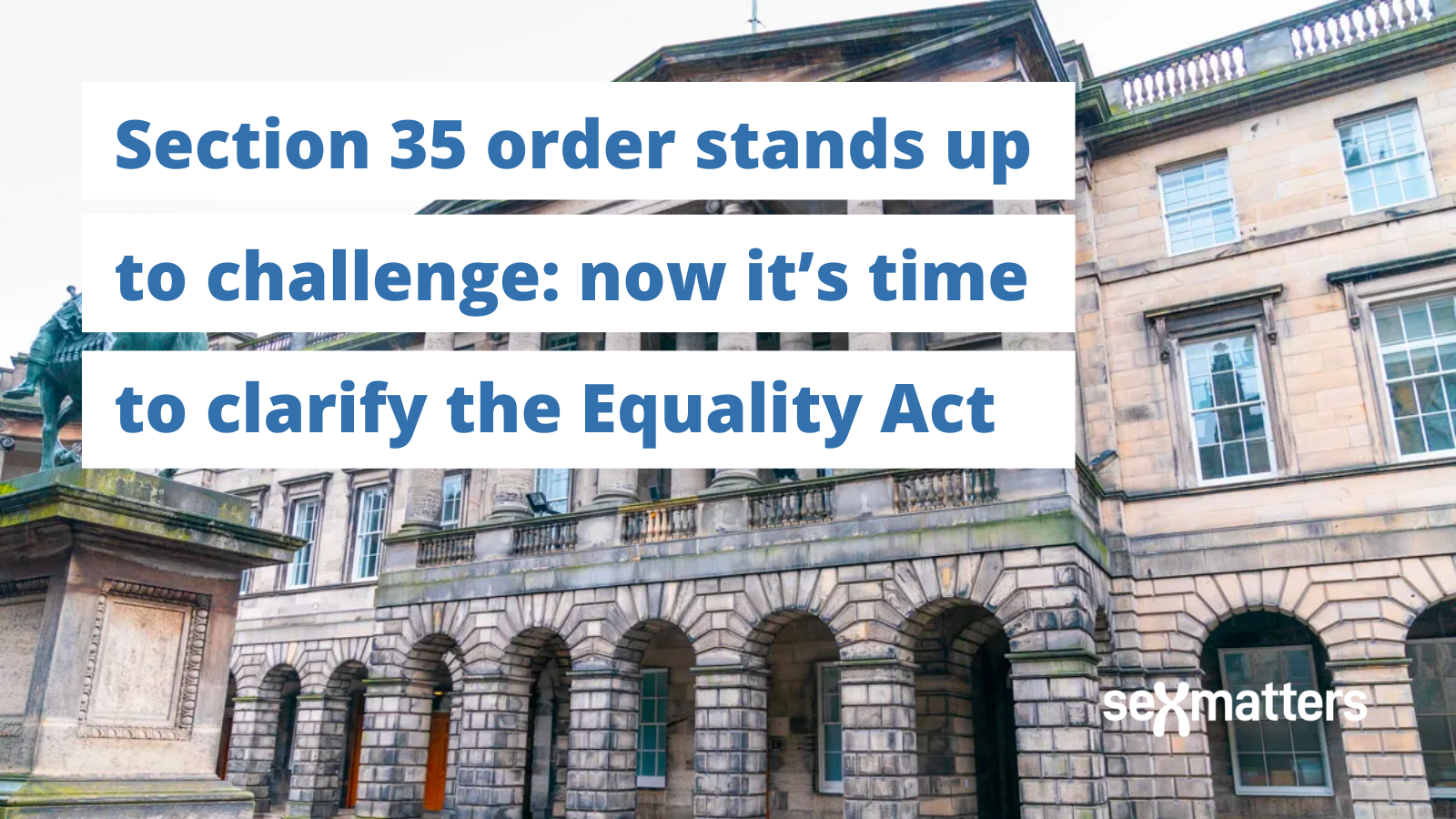Section 35 appeal rejected

The Court of Session has rejected the appeal by the Scottish Government against the UK Government’s Section 35 order to prevent the Gender Recognition Reform (Scotland) Bill becoming law.
The Scottish Government’s argument that the Secretary of State for Scotland “acted irrationally by failing to acquaint himself with the relevant facts and material before making the Order” was rejected by the judge, Lady Haldane. She noted that with a four-week deadline to decide whether to invoke Section 35 of the Scotland Act after the bill was passed last Christmas, he could not undertake an extensive information-gathering exercise and had to rely on information and advice from others.
The judgment notes that this included a letter from the Chair of the Equality and Human Rights Commission and submissions from “organisations active in the area of sex-based rights,” such as Sex Matters and Murray Blackburn Mackenzie, as well as notes from the UN Special Rapporteur Reem Alsalem and the UN Independent expert Victor Madrigal-Borloz.
“Much of this material supported the concerns raised about adverse effects, particularly as regards the issue of inadequate safeguards, and some did not provide such support, such as the letter from Mr Madrigal-Borloz.”
Court of Session, December 2023
Lady Haldane also commented that the submissions to the Court of Session from Stonewall and the Equality Network disagreed with each other over the question of the significance of obtaining a GRC.
Stonewall’s submission stated:
“Trans people pursue this process because of the significant advantages that follow from obtaining a GRC. Without a GRC, the gender marker on a trans person’s birth, marriage or death certificate will not match their gender presentation (and may not match the gender marker on legal documents such as passports and driving licences, which do not require a GRC to change the gender marker). Any time a trans person is required to produce a birth, marriage or death certificate, they will be outed as trans.”
Stonewall submission
Whereas the Equality Network said:
“There is at the heart of the dispute a misconception about what having a Gender Recognition Certificate (‘GRC’) does and does not do. A GRC recognises the way in which a trans person is already living, it does not grant permission to them to do so. There are, as the Intervener submits in more detail below, very few occasions in which having a GRC has a practical effect. That does not detract from what it means to a trans person to have a GRC… The focus of the respondent’s reasons for making the s.35 Order is on ‘legal sex’; but in the day-to-day life of a trans person, the concept of ‘legal sex’ is unimportant.”
Equality Network submission
Sex Matters is relieved that the Court of Session in Scotland found in favour of the UK Government’s decision to use Section 35 to block the Gender Recognition Reform Bill from royal assent after it was rushed through without adequate consideration of the risks and impacts.
As MBM described it last year, this was the result of “years of an unusually poor policy process, insincere consultations, clearly deliberate evasion on a key point, and a wasted opportunity to improve the law at earlier parliamentary stages”. The UK Government therefore acted in a timely way to stop an ill-conceived law that would have had adverse effects on the operation of the Equality Act and the protection it gives to women and girls.
We are pleased that, together with MBM, legal academic Michael Foran and others, we were able to play a part in providing rapid technical advice on human-rights matters and contributing to the sound administration of the Equality Act, which protects everyone’s rights.
However, this case has further exposed the lack of clarity about the interaction between the Equality Act and the Gender Recognition Act, and what having a gender-recognition certificate (GRC) means in practice.
What should happen next?
If judges, government bodies, and human-rights organisations are unable to agree on the basic interpretation of a law with which every person in the UK must comply in their everyday working life, this suggests it is time for Parliament to clarify the law.
As Kemi Badenoch, the Minister for Women and Equalities, said in the House of Commons on Wednesday:
”As a result of the Haldane judgment [in the For Women Scotland case] there is now confusion between biological sex and legal sex and certainly in terms of the interpretation that people put on it… The law is no longer clear. In fact, I would go so far as to say that the law is now a mess because of changing times. We need to provide clarity.”
Kemi Badenoch
She promised that the government in Westminster would now carry out work to fix that.
While the judgment in the Section 35 appeal prevents self-ID being brought into law in Scotland, it does not provide clarity about what a GRC means.
We call on the UK Government to take the necessary clear and bold action now to clarify, whether through secondary or primary legislation, the meaning of sex in the Equality Act.
It should take immediate action to make clear in the information provided to GRC holders that the certificate is not an access-all-areas pass to services and spaces provided for the opposite sex, or a way to compel others to pretend that a person is the opposite sex.
Sex Matters will continue to provide evidence-based analysis and press all administrations to protect everyone’s rights in line with the European Convention on Human Rights.
